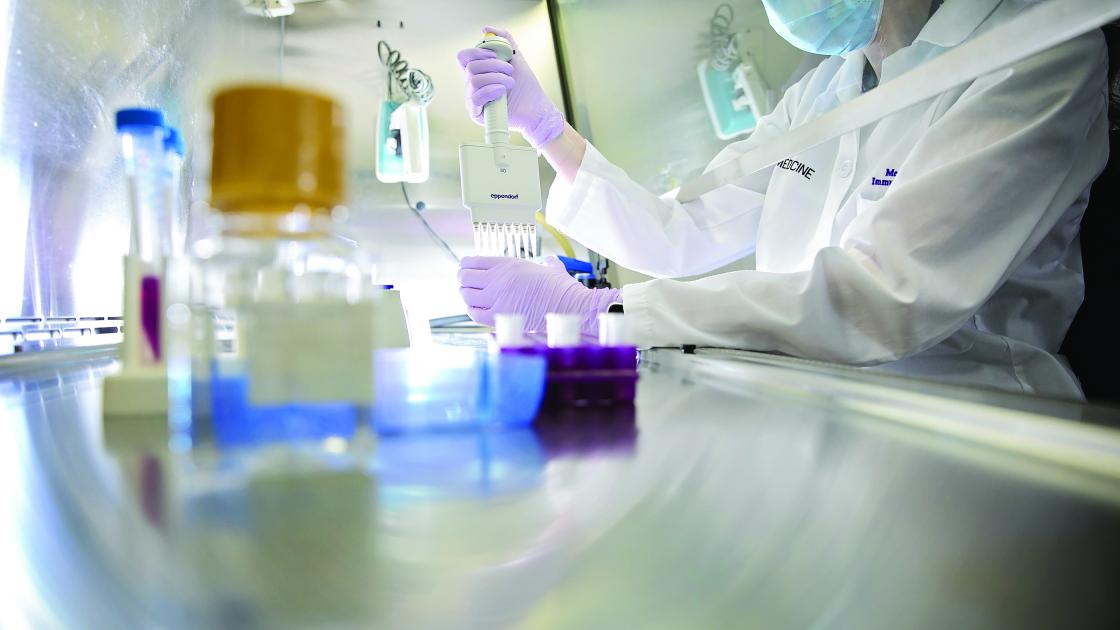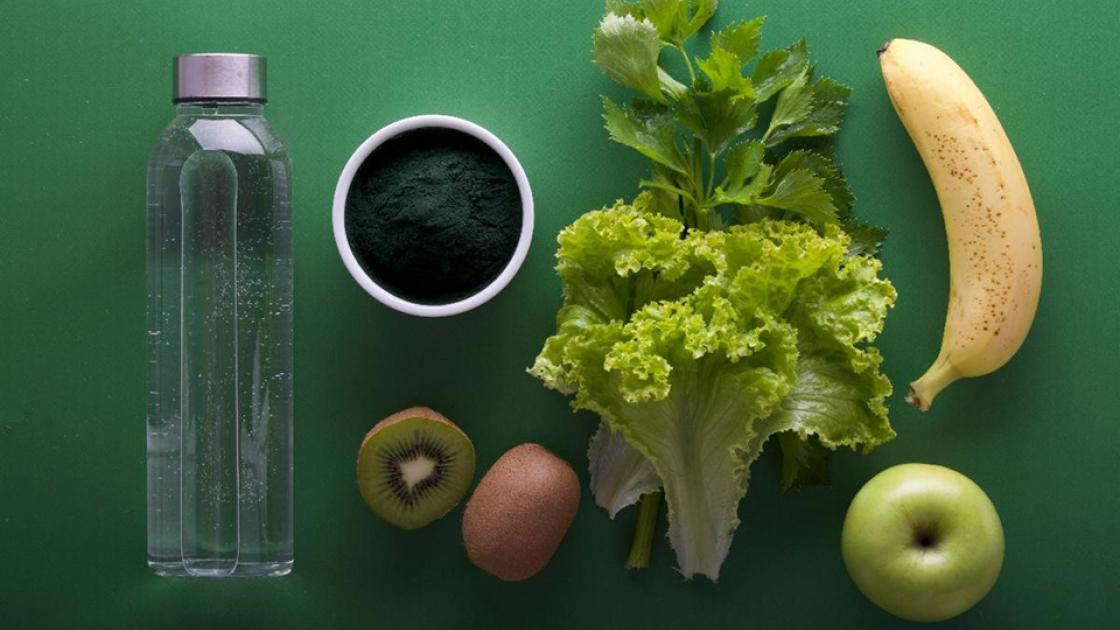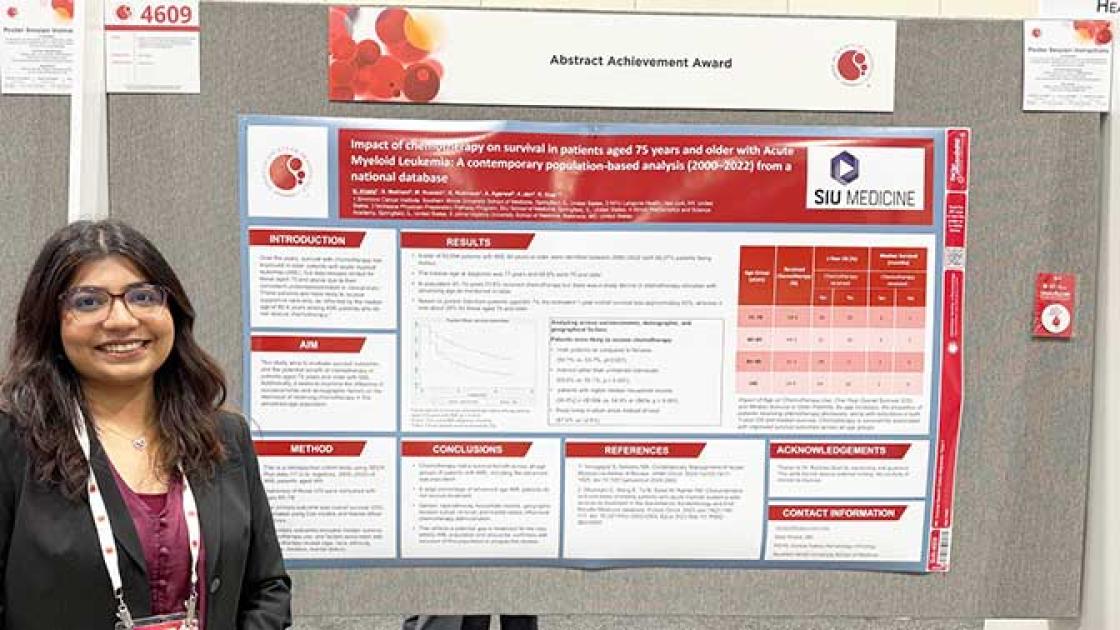
Research adds science, strength to SIU COVID response
State institutions are required to have emergency response plans in place for catastrophic events like floods, fires, tornadoes and active shooters. A global pandemic, on the other hand, is not something for which most have prepared a detailed playbook.
In March, research faculty at SIU School of Medicine found themselves creating one on the fly. The work of SIU’s scientific investigators was crucial to not only maintain important research functions, but also to channel new energy toward combatting the novel SARS-CoV-2 virus.
Associate Dean for Research Donald Torry, PhD, oversees about 175 full- and part-time medical personnel dedicated to research spanning the continuum from discovery-based science and education to clinical trials. The institution has approximately 140 active extramurally funded projects from sources like the National Institutes of Health, worth $16.6 million in annual funding. Typical economic multipliers show that this translates into more than $100 million in economic benefit to central and southern Illinois. The medical school’s studies have advanced understanding and patient care in women’s health, cancer, hearing, regenerative medicine and aging, to name a few.
The school’s modest size presented a distinct advantage when the COVID-19 outbreak occurred this spring. While other larger research universities across the country had their programs completely shut down, SIU was able sustain its operations and maintain leadership in research as the crisis developed.
Shelley Tischkau, PhD, the interim chair of both the departments of Pharmacology and Medical Microbiology, Immunology and Cell Biology (MMICB), met with faculty to devise a plan structured to protect investigators, students and staff and consulted with Dr. Torry. Laboratory shifts were then staggered, working from home was encouraged and all proposed new projects were tabled. Lab spaces were big enough to allow natural separation and still get work done. Foot traffic was reduced by up to 90 percent, but the essential research activity continued uninterrupted. “People were able to submit papers and get grants out the door during the pandemic, which is remarkable,” says Tischkau.
Because of its place in the community as an academic medical center, a receptive audience was looking to SIU for education on the novel coronavirus. Instructors offered lessons online and created social media content to help educate the public and address their concerns. Assistant professor Michael Olson, PhD, has a background in bacteriology, but had volunteered to teach virology to the second-year MMICB students in 2019. The timing was fortuitous. “He was primed, and then the coronavirus hit,” Tischkau says. “He’s become a great community educator on social media.” Olson is now collaborating with Erin Hascup, PhD, and Kevin Hascup, PhD, in the Center for Alzheimer’s Disease and Related Disorders, on a grant to study the role the viral infection plays within the aging brain.
Across SIU’s campuses, numerous research and clinical teams came forward to donate materials and expertise to join the fight against COVID-19. Two especially ambitious projects were launched to meet urgent supply-and-demand needs.
In March, Governor J.B. Pritzker’s office asked university laboratories to help make up for a shortfall in viral transport media (VTM), a key ingredient for coronavirus testing. Faculty in the College of Science, Department of Microbiology (Scott Hamilton-Brehm, Matt Geisler, Vjollca Konjufca, Laxmi Sagwan-Barkdoll and others) at SIUC, with assistance from School of Medicine colleagues (Buffy Ellsworth, Buck Hales, Karen Hales and others) teamed to produce the VTM mixture for Illinois Department of Public Health laboratories.
The fluid is composed of substances that preserve the genetic information of a virus until it can be tested. The researchers gathered supplies in bulk, calculated the orders-of-magnitude increases for the larger batch recipe and kicked into production. They produced 115,000 vials of VTM for the state over two months, working 5 days a week from 7 a.m. to 7 p.m., until commercial labs were able to pick up the slack.
In Springfield, MMICB associate professor Andy Wilber, PhD, Chris Chambers, PhD, and Torry developed a quantitative serological antibody test that can be used to gauge the effectiveness of new vaccines. Antibodies indicate whether an individual has mounted a robust response to a viral attack. They are also working on an in viro neutralization test to determine if those antibodies can limit the abilty of the virus to infect human cells. Knowledge of the immune response is critical, Torry says, “because we need to know how much protection is necessary. How long does it last? If it tapers off, are you susceptible to a reoccurrence?”
The group has partnered with Memorial Medical Center, the Illinois Department of Public Health, the Mississippi Valley Regional Blood Center and the School of Medicine’s Division of Infectious Disease to obtain serum samples for validation of the assay. The tests for neutralizing SARS-CoV-2 antibodies can be used to determine immune status in patients under investigation, in frontline SIU Medicine providers and for other purposes.
Amid all the turbulence, Dr. Torry is encouraging faculty to find the teachable moments.
“As an academic medical institution, we constantly try to put things into context for our learners. They are experiencing this pandemic in real-time with us. None of us have been through anything like this either, but the faculty have a certain knowledge-base that allows us to better understand, educate and model scenarios today than what worked in, say 1918.”
“We’re figuring out ways to use components of this pandemic for our students in epidemiology, public health, public service and research. The pandemic is affecting tens of millions of Americans. It’s providing a shining example of why biomedical research and its application to public health is so important.”
The Associate Dean for Research says he’s proud of the way that the medical school has responded.
“I knew SIU had a great teamwork attitude before this happened. It’s one of the reasons I wanted to come here. There’s a cultural mindset that we’re all in this together, that we’ll not only persevere but lead at SIU. It’s been shown throughout this pandemic.”
Dr. Donald Torry has been leading the school’s research programs as associate dean for research since 2016. Originally from Washington, IL, he joined the Department of Medical Microbiology, Immunology and Cell Biology (MMICB) faculty in 2000 and was appointed chair of the department in 2012. Torry has roots at SIU, earning his doctorate, master’s and bachelor’s degrees in Carbondale. He also completed a three-year research fellowship in pathology at Harvard Medical School and the Dana-Farber Cancer Institute in Boston, Mass., in 1992. From 1993-2000, he was an assistant professor of immunology and an associate professor of obstetrics and gynecology at the University of Tennessee Graduate School of Medicine in Knoxville, Tenn. The father of six seized the opportunity to return to SIU in 2000, to be closer to family and his teaching roots.
In 2019, SOM Dean and Provost Jerry Kruse, MD, MSPH, approached Torry about combining the departments of MMICB and Pharmacology administratively, while running them on parallel tracks academically. Torry discussed the reorganization plan with faculty, and they were receptive to the idea. With the merger, he was able to pass the MMICB reins to Shelley Tischkau, PhD, as the new interim chair of both departments, and focus on his duties as Associate Dean for Research.



